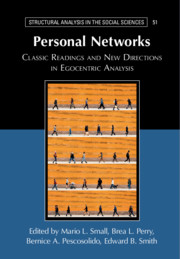Book contents
- Personal Networks
- Structural Analysis in the Social Sciences
- Personal Networks
- Copyright page
- Contents
- Figures
- Tables
- Contributors
- I Background
- II Early Foundations
- 1 From Georg Simmel, “On the Significance of Numbers for Social Life: Introduction,” “The Isolated Individual and the Dyad,” “The Triad,” and “The Web of Group Affiliations”
- Georg Simmel’s Contribution to Social Network Research
- 2 From Elihu Katz and Paul F. Lazarsfeld, Personal Influence
- Influencers, Backfire Effects, and the Power of the Periphery
- 3 From J. Clyde Mitchell, “The Concept and Use of Social Networks”
- On J. Clyde Mitchell’s “The Concept and Use of Social Networks”
- 4 From Elizabeth Bott, “Urban Families: Conjugal Roles and Social Networks”
- Commentary on Bott’s “Family and Social Network”
- 5 From Leon Festinger, Stanley Schachter, and Kurt Back, Social Pressures in Informal Groups
- Festinger, Schachter, and Back’s Social Pressures in Informal Groups
- 6 From H. Russell Bernard, Peter Killworth, David Kronenfeld, and Lee Sailer, “The Problem of Informant Accuracy”
- Implications of Informant Accuracy Research for Ego Networks
- 7 From Harrison C. White, Identity and Control
- On Parachutes and Lion-Taming
- III Later Foundations
- IV New Perspectives
- Index
- Recent Books in the Series
- References
3 - From J. Clyde Mitchell, “The Concept and Use of Social Networks”
from II - Early Foundations
Published online by Cambridge University Press: 01 October 2021
- Personal Networks
- Structural Analysis in the Social Sciences
- Personal Networks
- Copyright page
- Contents
- Figures
- Tables
- Contributors
- I Background
- II Early Foundations
- 1 From Georg Simmel, “On the Significance of Numbers for Social Life: Introduction,” “The Isolated Individual and the Dyad,” “The Triad,” and “The Web of Group Affiliations”
- Georg Simmel’s Contribution to Social Network Research
- 2 From Elihu Katz and Paul F. Lazarsfeld, Personal Influence
- Influencers, Backfire Effects, and the Power of the Periphery
- 3 From J. Clyde Mitchell, “The Concept and Use of Social Networks”
- On J. Clyde Mitchell’s “The Concept and Use of Social Networks”
- 4 From Elizabeth Bott, “Urban Families: Conjugal Roles and Social Networks”
- Commentary on Bott’s “Family and Social Network”
- 5 From Leon Festinger, Stanley Schachter, and Kurt Back, Social Pressures in Informal Groups
- Festinger, Schachter, and Back’s Social Pressures in Informal Groups
- 6 From H. Russell Bernard, Peter Killworth, David Kronenfeld, and Lee Sailer, “The Problem of Informant Accuracy”
- Implications of Informant Accuracy Research for Ego Networks
- 7 From Harrison C. White, Identity and Control
- On Parachutes and Lion-Taming
- III Later Foundations
- IV New Perspectives
- Index
- Recent Books in the Series
- References
Summary
A reflection on J. Clyde Mitchell’s (1969) classic piece “The concept and use of social networks”. In the piece, Mitchell lays out the “known world” of social network analysis, discussing fundamental concepts, theory and methods. Looked at 50 years later, we see much that is core to how we think about networks today, but we also see some differences. Network perspectives today are often associated with a structuralist sensibility that emphasizes opportunities and constraints and de-emphasizes meanings and agency. In contrast, Mitchell plays up opportunities and agency and is very interested in meanings and relational norms. His view of relationships as micro-contexts for interpreting interactions is interesting and has bearing on several “modern” areas of research, including dormant ties (Levin, Walter and Murnighan 2011), situationally activated networks (Smith, Menon and Thompson 2012) and network dynamics.
Information
- Type
- Chapter
- Information
- Personal NetworksClassic Readings and New Directions in Egocentric Analysis, pp. 87 - 97Publisher: Cambridge University PressPrint publication year: 2021
